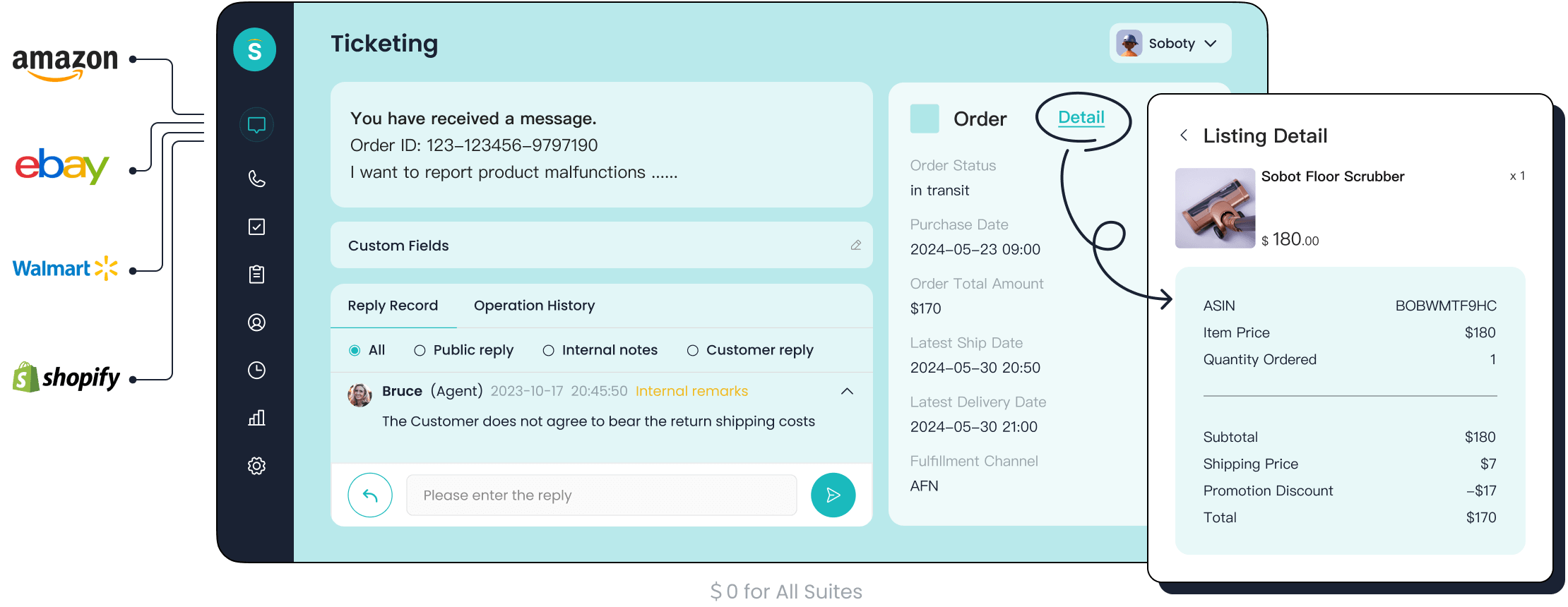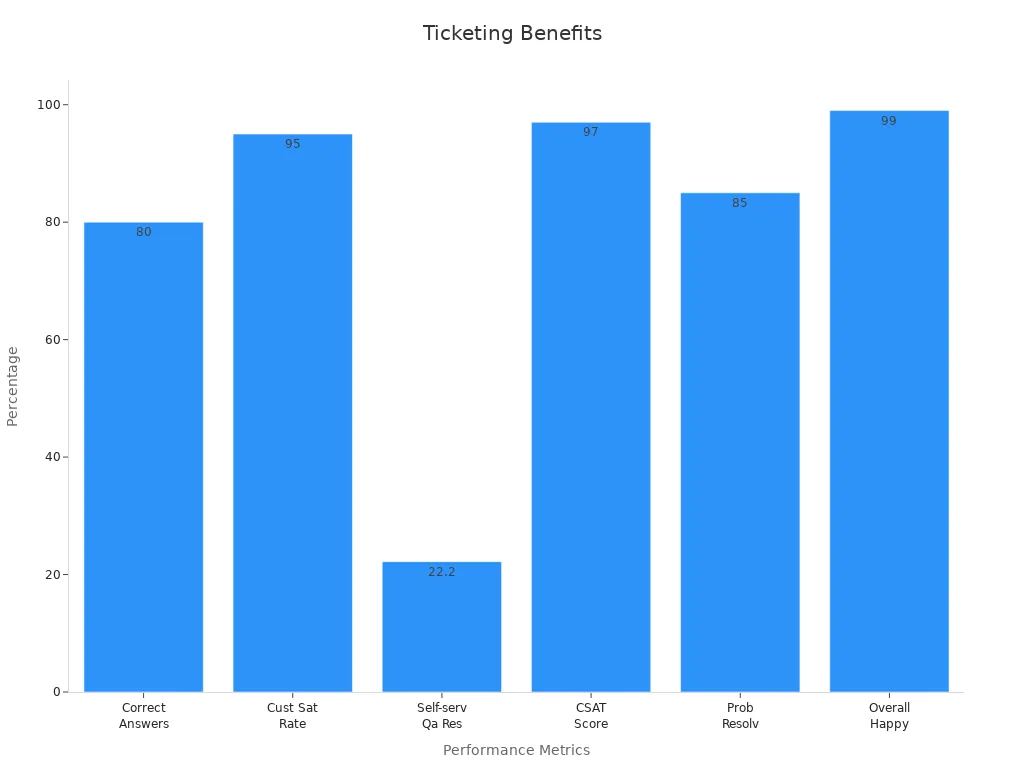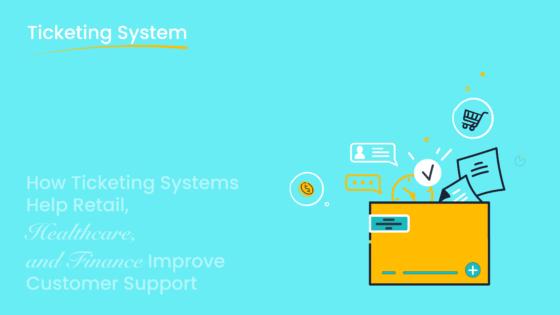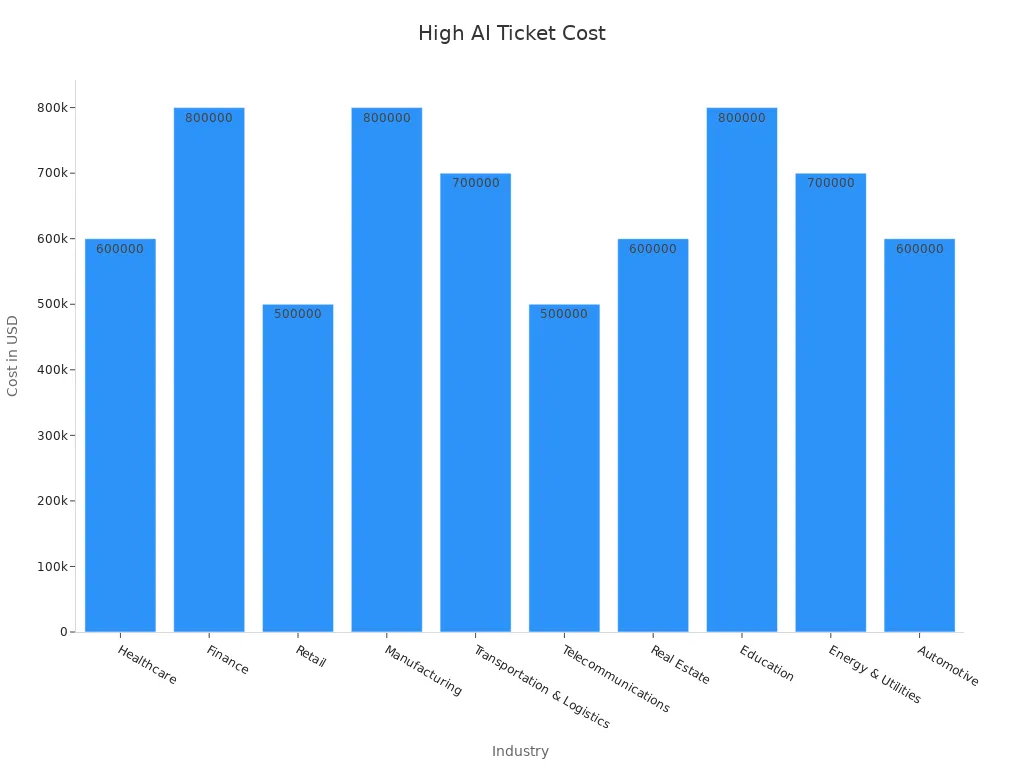Evaluating the Best AI Ticketing Systems Pros and Cons

AI ticketing systems are transforming how businesses handle customer service. These systems use artificial intelligence to automate ticket creation, routing, and resolution, making customer interactions smoother and faster. For instance, companies using AI report a 37% drop in first response times and resolve tickets 52% faster. This efficiency doesn't just save time; it also boosts customer satisfaction.
When choosing the best customer service ticket system, you need to weigh its advantages and challenges. After all, the right solution can significantly impact your operations and customer loyalty. That’s where Sobot comes in. With its AI-powered ticketing system, Sobot offers a unified platform that integrates all communication channels, ensuring seamless support. Whether you're managing emails, chats, or voicemails, Sobot's automation tools make handling tickets effortless while enhancing efficiency.
What Is an AI Ticketing System?

Definition and Purpose of AI Ticketing Systems
An AI ticketing system is a tool that uses artificial intelligence to manage customer inquiries efficiently. It automates tasks like ticket creation, assignment, and resolution, making your customer service operations faster and more accurate. These systems are designed to handle repetitive queries, such as password resets or order tracking, freeing up your team to focus on more complex issues.
Why are businesses adopting these systems? The numbers speak for themselves. The AI for customer service market is expected to grow from $12.06 billion in 2024 to $47.82 billion by 2030, with a compound annual growth rate (CAGR) of 25.8%. This rapid growth shows how essential AI tools have become for improving efficiency and personalization in customer interactions.
| Statistic | Description |
|---|---|
| 50% | User tickets related to password resetting, a common issue AI can handle automatically. |
| 51% | Customers who prefer interacting with bots over human agents. |
| 90% | Tickets that AI systems can handle automatically, showcasing their efficiency. |
Applications of AI in Customer Service
AI in customer service has revolutionized how businesses interact with their customers. These systems excel in several areas:
- Integration with other systems: AI ticketing solutions work seamlessly with platforms like Shopify and Salesforce, ensuring smooth operations.
- Error reduction: Machine learning minimizes mistakes and improves response accuracy over time.
- Handling complex issues: Advanced AI systems use contextual understanding to tackle nuanced customer scenarios.
- Enhancing customer interactions: Natural language processing (NLP) enables personalized, human-like responses.
For example, AI customer service tools analyze past interactions to tailor responses, making every conversation feel unique. They also handle repetitive queries with unmatched consistency, ensuring your customers get the answers they need quickly.

How Sobot's Ticketing System Enhances Customer Support
Sobot's AI-powered ticketing system takes customer service to the next level. It offers a unified platform that integrates email, voicemail, and chat, so you can manage all communication channels in one place. The system automates ticket creation and routing, saving you time and reducing manual effort.
What sets Sobot apart? Its intelligent tools, like custom trigger rules and SLA management, ensure tickets are resolved accurately and on time. Plus, it supports multilingual capabilities, making it perfect for global businesses. With Sobot, you can expect a 95% customer satisfaction rate and an 85% problem resolution rate.

By choosing Sobot, you're not just improving efficiency; you're also creating happier customers who are more likely to stay loyal to your brand.
How Do AI Ticketing Systems Work?
Key Technologies Behind AI Ticketing Systems
AI ticketing systems rely on cutting-edge technologies to deliver seamless customer support. These technologies work together to automate processes, improve accuracy, and enhance user experiences. Here's a quick breakdown:
| Technology Type | Description |
|---|---|
| Data Preparation and Preprocessing | Extracts historical ticket data and uses NLP to identify key features. |
| AI Model Development and Training | Employs classification techniques and NLU models to understand and respond to user queries. |
| Ticket Resolution Suggestion | Uses collaborative filtering to recommend solutions based on similar past tickets. |
| System Deployment and Integration | Deploys AI models as microservices and integrates them into existing workflows. |
| Security and Access Control | Implements encryption and role-based access to ensure data security. |
| Additional Considerations | Evaluates cloud platforms for scalability and compliance with privacy regulations. |
These technologies allow AI systems to handle complex tasks like understanding customer intent, suggesting resolutions, and ensuring secure operations. For example, Sobot’s ticketing system uses AI to analyze customer data and provide accurate, multilingual responses, making it a reliable choice for global businesses.
Automation and Workflow Optimization
AI ticketing systems streamline workflows by automating repetitive tasks. This includes ticket creation, categorization, and routing. Here's how the process typically works:
- Ticket Creation and Initial Categorization: Customers submit tickets through email, chat, or other channels. AI categorizes them based on the issue type.
- Prioritization and Assignment: Tickets are prioritized by urgency and assigned to the right agent.
- Resolution and Follow-up: Agents resolve tickets, and AI ensures follow-ups to confirm customer satisfaction.
- Closing and Feedback Collection: Once resolved, tickets are closed, and feedback is gathered for improvement.
This automation saves time and boosts efficiency. For instance, a retail company reduced ticket volume by 50% using AI-powered self-service. Similarly, ClickUp agents resolved 25% more tickets per hour within a week of deploying AI. With Sobot, you can achieve similar results, as its system automates workflows while maintaining high accuracy.
Real-World Examples of AI Ticketing in Action
AI ticketing systems have proven their worth across industries. Here are some examples:
| Industry | Use Case | Example |
|---|---|---|
| Healthcare | Appointment scheduling & patient inquiries | AI handles bookings, rescheduling, and patient queries without staff involvement. |
| Finance | Fraud detection & dispute resolution | Automates dispute processes, flags suspicious transactions, and verifies account activity. |
| Travel & Hospitality | Flight & hotel booking modifications | Processes booking changes, cancellations, and refunds while notifying customers automatically. |
These examples highlight how AI simplifies operations and improves customer satisfaction. For instance, Sobot’s ticketing system integrates with platforms like Shopify to streamline e-commerce workflows, ensuring faster resolutions and happier customers.
Tip: By adopting AI ticketing systems like Sobot’s, you can save time, reduce costs, and deliver exceptional customer experiences.
Advantages of AI Ticketing Systems

Improved Efficiency and Faster Response Times
Imagine this: a customer submits a ticket, and instead of waiting hours or even days for a response, they get an answer in minutes. That’s the magic of an AI ticketing system. By automating repetitive tasks like ticket categorization and routing, these systems ensure faster response times and quicker resolutions. For example, AI can instantly identify the nature of a query and assign it to the right agent, saving valuable time.
Studies show that AI-powered ticketing systems can reduce first response times by up to 71% and ticket resolution times by 20-30%. This means your customers don’t have to wait, and your team can handle more tickets in less time. Sobot’s AI ticketing system takes this a step further by integrating all communication channels—email, chat, and voicemail—into one platform. This unified approach eliminates delays caused by switching between tools, ensuring consistent service quality.
Here’s a quick comparison to show how AI outshines traditional methods:
| Aspect | Traditional Ticketing | AI-Powered Ticketing |
|---|---|---|
| Response Time | Hours to days | Instant to a few hours |
| Resolution Time | Slower due to manual work | Faster with automation |
| Customer Satisfaction | Often lower | Higher due to speed |
With AI in customer service, you’re not just speeding things up—you’re also creating happier customers who feel valued.
Scalability for Growing Businesses
As your business grows, so does the volume of customer inquiries. Scaling traditional customer service often means hiring more agents, which can be costly and time-consuming. AI ticketing systems solve this problem by handling large volumes of tickets automatically. Whether you’re dealing with 100 tickets or 10,000, AI ensures every query gets the attention it deserves.
For instance, AI can automate tasks like triaging and assigning tickets, allowing your team to focus on complex issues. Machine learning algorithms also adapt to evolving data, improving accuracy over time. Sobot’s system is designed with scalability in mind. It uses cloud-based technology to handle load spikes effortlessly, making it perfect for businesses experiencing rapid growth.
Here’s how AI supports scalability:
- Automates repetitive tasks, speeding up response times.
- Enhances accuracy in ticket resolution, even as ticket volumes increase.
- Uses real-time data to predict and adapt to customer needs.
By choosing an AI ticketing system like Sobot’s, you’re future-proofing your operations. You’ll be ready to handle growth without compromising service quality.
Cost Savings Through Automation
Let’s talk numbers. Did you know that AI ticketing systems can reduce support expenses by up to 70%? By automating routine tasks, these systems cut down on the need for manual intervention, saving both time and money. For example, Sobot’s system can deflect up to 60% of tickets through self-service options, allowing customers to find solutions independently.
Here’s a breakdown of how AI saves costs:
| Evidence Type | Description |
|---|---|
| Automation of Routine Tasks | Saves hours daily by automating ticket assignment and follow-ups. |
| Enhanced Self-Service | Reduces ticket volume by enabling customers to resolve issues on their own. |
| Improved First Contact Rates | Increases efficiency, reducing the need for escalations and additional agents. |
Sobot’s AI ticketing system also improves first contact resolution rates by 20-30%, preventing backlogs and SLA breaches. This means your team can focus on high-priority tasks, increasing productivity by 15-20%. Plus, with 24/7 availability, your customers can get help anytime, reducing the need for after-hours staffing.
In short, AI isn’t just a tool—it’s an investment that pays for itself by boosting efficiency, cutting costs, and keeping your customers happy.
Enhanced Analytics and Insights for Better Decision-Making
When it comes to making smarter business decisions, data is your best friend. AI ticketing systems don’t just help you manage customer inquiries—they also provide powerful analytics that can transform how you operate. By analyzing every interaction, these systems uncover patterns and trends that might otherwise go unnoticed. This means you can make decisions based on facts, not guesses.
One of the biggest advantages of AI ticketing systems is their ability to predict future trends. For example, predictive analytics can forecast ticket volumes during peak seasons. This helps you allocate resources more effectively, ensuring your team isn’t overwhelmed. Imagine knowing in advance when your busiest times will be and preparing for them with ease. That’s the kind of insight AI brings to the table.
These systems also identify recurring issues. If customers keep asking about the same problem, the system flags it. You can then address the root cause, reducing the number of tickets over time. It’s like solving a puzzle—once you find the missing piece, everything falls into place. Sobot’s ticketing system excels at this, using advanced tools to pinpoint problem areas and suggest actionable solutions.
But it doesn’t stop there. AI ticketing systems also analyze customer feedback to gauge sentiment. Are your customers happy? Frustrated? Sentiment analysis gives you the answers, helping you improve your service where it matters most. For instance, if feedback shows dissatisfaction with response times, you can adjust your workflows to speed things up.
Real-time dashboards are another game-changer. These dashboards display key metrics like response times, resolution rates, and agent performance. With this information at your fingertips, you can monitor your team’s efficiency and make adjustments on the fly. Sobot’s system takes it a step further by offering detailed performance metrics for agents. This helps you identify training needs and recognize top performers, boosting morale and productivity.
Personalization through data analysis is another standout feature. By studying customer interactions, AI systems tailor responses to individual needs. This makes every interaction feel personal and meaningful. For example, Sobot’s ticketing system uses customer data to provide personalized solutions, ensuring a seamless experience. It’s not just about solving problems—it’s about making customers feel valued.
Here’s a quick look at how analytics improve decision-making:
- Predictive analytics forecast ticket loads, helping with resource planning.
- Recurring issues are flagged for proactive problem-solving.
- Sentiment analysis highlights areas for service improvement.
- Performance metrics identify training opportunities and top performers.
- Real-time dashboards provide instant insights into key metrics.
With tools like these, you’re not just reacting to problems—you’re staying ahead of them. Sobot’s AI-powered ticketing system gives you the insights you need to make informed decisions, improve efficiency, and deliver exceptional customer service. It’s like having a crystal ball for your business, but better.
Tip: Use analytics to focus on what matters most—your customers. The more you understand their needs, the better you can serve them.
Challenges of AI Ticketing Systems
Lack of Human Empathy in Customer Interactions
AI ticketing systems are great at handling repetitive tasks, but they often fall short when it comes to understanding emotions. This lack of human empathy can make interactions feel robotic, leaving customers frustrated. Imagine reaching out for help with a sensitive issue, only to receive a generic, automated response. That’s where the gap lies.
- AI systems struggle to pick up on emotional cues, which can make conversations feel cold or impersonal.
- Human agents excel at interpreting emotions and addressing subtle concerns, something AI just can’t replicate.
- A survey by Hiver HQ found that 52% of professionals believe customers prefer human agents because of their genuine empathy.
- In emotionally charged situations, like resolving a billing error or handling a complaint, human agents are essential for building trust and diffusing tension.
While AI in customer service offers 24/7 availability, it’s important to balance automation with human support. Sobot’s ticketing system addresses this by allowing seamless escalation to human agents when empathy is needed. This ensures your customers feel heard and valued, even in challenging situations.
Data Privacy and Security Concerns
AI ticketing systems rely on vast amounts of data to function effectively, but this reliance introduces risks. Data breaches, unauthorized access, and profiling are just a few of the challenges businesses face. Customers trust you with their personal information, and any mishandling can lead to serious consequences.
| Threat Type | Description |
|---|---|
| Profiling | Risks associated with the unauthorized profiling of users in AI ticketing systems. |
| Unauthorized Access | Potential for unauthorized access to sensitive personal information. |
| Data Breaches | Risks of data breaches that can lead to significant financial and personal harm. |
| Socio-Technical Threats | Consumer reluctance to control apps, conflicting objectives between companies, and regulatory ambiguities. |
| Malicious Activities by Operators | Risks from dishonest individuals and organizations, including data theft and service disruptions. |
| Insider Threats | Actions like disabling GPS devices that compromise system reliability. |
| Financial Motivations | Criminal motivations leading to identity theft and financial loss. |
| Industrial Espionage | Risks from dishonest organizations aiming to sabotage competitors. |
To mitigate these risks, Sobot’s ticketing system incorporates advanced security measures like encryption and role-based access. It also complies with global data privacy regulations, ensuring your customers’ information stays safe. By prioritizing security, you can build trust and reduce customer frustration with automation.
High Initial Implementation Costs
Implementing an AI ticketing system can be a significant investment, especially for small and medium-sized businesses. The costs vary by industry, but they often include software, hardware, and training expenses. Here’s a breakdown:
| Industry | Estimated Pricing Range |
|---|---|
| Healthcare | $300,000 - $600,000+ |
| Finance | $300,000 - $800,000+ |
| Retail | $200,000 - $500,000+ |
| Manufacturing | $400,000 - $800,000+ |
| Transportation & Logistics | $500,000 - $700,000+ |
| Telecommunications | $300,000 - $500,000+ |
| Real Estate | $250,000 - $600,000+ |
| Education | $150,000 - $800,000+ |
| Energy & Utilities | $400,000 - $700,000+ |
| Automotive | $600,000 - $500,000+ |

While the upfront costs may seem daunting, the long-term benefits often outweigh the initial investment. AI systems reduce operational costs by automating repetitive tasks and improving efficiency. Sobot’s ticketing system, for example, offers cost reduction through features like self-service options and intelligent ticket routing. These tools not only save money but also enhance customer satisfaction by providing faster resolutions.
Tip: Consider the scalability and ROI of an AI ticketing system before making a decision. A well-implemented system can pay for itself by streamlining operations and improving customer service.
Addressing Complex Scenarios with AI
AI ticketing systems are great at handling routine tasks, but what about the tricky stuff? You know, those complex scenarios that require more than just a quick automated response. That’s where advanced AI really shines. By combining machine learning, natural language understanding (NLU), and contextual analysis, AI systems can tackle even the most challenging customer service issues.
How AI Handles Complex Scenarios
AI doesn’t just stop at answering simple questions. It dives deeper into customer interactions to understand the context and intent behind each query. For example:
-
Contextual Understanding: AI analyzes the entire conversation, not just individual messages. This helps it identify the root cause of a problem. Let’s say a customer asks about a delayed shipment. Instead of just providing tracking info, the system might also check for potential issues like payment delays or inventory shortages.
-
Dynamic Decision-Making: AI uses decision trees and predictive analytics to recommend solutions. If a customer reports a recurring issue, the system might suggest escalating the ticket to a specialist or offering a refund.
-
Multilingual Support: Complex scenarios often involve language barriers. AI systems like Sobot’s ticketing platform handle multiple languages seamlessly. This ensures customers get accurate responses, no matter where they’re from.
Real-Life Example: Sobot in Action
Let’s look at OPPO, a global smart device leader. During peak shopping seasons, OPPO faced a surge in customer inquiries. Many of these were complex, involving order modifications, refunds, and technical troubleshooting. By implementing Sobot’s AI-powered ticketing system, OPPO achieved an 83% chatbot resolution rate. The system handled repetitive queries while escalating complex ones to human agents. This human-machine collaboration improved efficiency and boosted customer satisfaction to 94%.
Did You Know? AI systems like Sobot’s can reduce ticket resolution times by up to 30%, even for complex issues. That’s a game-changer for businesses dealing with high volumes of customer inquiries.
Benefits of AI in Complex Scenarios
Here’s why AI is a must-have for handling challenging customer service situations:
| Feature | Benefit |
|---|---|
| Contextual Analysis | Identifies the root cause of issues for accurate resolutions. |
| Predictive Analytics | Anticipates customer needs and suggests proactive solutions. |
| Seamless Escalation | Transfers complex tickets to human agents without losing context. |
| Multilingual Capabilities | Breaks language barriers for global customer support. |
| Integration with Other Tools | Works with platforms like Shopify to streamline workflows. |
These features don’t just solve problems—they create a smoother, more personalized experience for your customers.
Why Sobot Stands Out
Sobot’s ticketing system goes beyond basic automation. It uses AI to analyze customer data, predict trends, and provide tailored solutions. For instance, its SLA management ensures high-priority tickets get resolved on time. Plus, with tools like custom triggers and smart notifications, you’ll never miss a beat. Whether you’re in retail, finance, or gaming, Sobot adapts to your needs, making it the perfect choice for businesses of all sizes.
Pro Tip: Use Sobot’s analytics to identify recurring issues. Fixing these at the source can reduce ticket volumes and improve customer satisfaction.
Final Thoughts
Complex scenarios don’t have to be a headache. With the right AI ticketing system, you can handle them efficiently while keeping your customers happy. Sobot’s advanced tools and intelligent automation make it easier than ever to tackle challenges head-on. Ready to transform your customer service? Explore Sobot’s ticketing system today and see the difference for yourself.
Key Features of the Best Customer Service Ticket System
Automation and Workflow Management
Automation is the backbone of any efficient customer service ticket system. It takes over repetitive tasks, like ticket categorization and routing, so your team can focus on solving complex issues. This not only saves time but also ensures consistency in handling customer inquiries.
For example, automated workflows can prioritize tickets based on urgency, ensuring high-priority issues are addressed first. Sobot’s ticketing system excels here by using custom triggers to route tickets to the right agents instantly. It even supports time-triggered actions, like sending follow-up emails, to keep customers informed.
Here’s how automation improves operations:
- Heightened efficiency: Tasks like ticket assignment happen in seconds, reducing delays.
- Improved agent productivity: Agents spend less time on admin work and more on customer interactions.
- Better resource allocation: Automation frees up human agents to handle emotionally sensitive or complex queries.
| Metric | Description |
|---|---|
| Average Resolution Time | Measures how quickly customer issues are resolved, reflecting operational efficiency. |
| Customer Satisfaction Scores | Tracks customer feedback to gauge the quality of support provided. |
| Agent Productivity | Evaluates how effectively agents use their time, identifying areas for workflow improvement. |
By automating routine tasks, you can lower operational costs and boost customer satisfaction. Sobot’s system takes it a step further with SLA reminders and smart notifications, ensuring no ticket falls through the cracks.
Advanced Analytics and Reporting Dashboards
Data is your secret weapon for improving customer service. The best ticketing systems provide advanced analytics and dashboards that give you a clear picture of your operations. These tools help you track key metrics like ticket volume, response time, and customer satisfaction.
For instance, Sobot’s reporting dashboard offers real-time insights into agent performance and ticket trends. You can identify recurring issues, measure the effectiveness of your workflows, and even predict future ticket volumes. This allows you to plan better and make data-driven decisions.
| Metric | Description |
|---|---|
| Ticket Volume | Tracks the number of incoming service requests over time. |
| Response Time | Measures how quickly agents respond to customer inquiries. |
| Ticket Quality | Assesses responses based on empathy, accuracy, and adherence to brand guidelines. |
| Multichannel Support Options | Evaluates the system’s ability to handle tickets across various channels like email, chat, and voice. |
These insights aren’t just numbers—they’re actionable. For example, if you notice a spike in tickets about a specific issue, you can update your knowledge base to address it proactively. Sobot’s analytics tools make this process seamless, helping you improve both efficiency and customer satisfaction.
Integration with Existing Tools and Platforms
A great ticketing system doesn’t work in isolation. It integrates seamlessly with your existing tools, creating a unified workspace for your team. This means you can connect your ticketing system with platforms like Shopify or Salesforce to streamline operations.
Integration offers several benefits:
- Unified customer data: Access all customer information in one place, enabling personalized interactions.
- Enhanced efficiency: Agents don’t need to switch between tools, saving time and reducing errors.
- Improved customer loyalty: Personalized service fosters stronger relationships with your customers.
Sobot’s ticketing system shines in this area. It integrates with email, voicemail, and chat, as well as popular e-commerce platforms. This ensures a seamless experience for both your team and your customers. By unifying your tools, you can deliver faster, more personalized support that keeps customers coming back.
Pro Tip: Look for a system that supports multichannel integration. This ensures you can meet your customers wherever they are, whether it’s on social media, email, or live chat.
Customization and Scalability Options
When it comes to AI ticketing systems, customization and scalability are game-changers. These features let you tailor the system to your business needs while ensuring it grows with you. Whether you're a small startup or a global enterprise, the right system adapts to your requirements effortlessly.
Customization allows you to align the system with your brand's tone and style. For example, you can tweak chatbot behavior to match your company’s voice, making interactions feel more personal. Sobot’s ticketing system excels here. It offers tools like custom triggers and categorized templates, so you can create workflows that fit your processes perfectly. Plus, its multilingual support ensures smooth communication with customers worldwide.
Scalability is equally important. As your business grows, so does the volume of customer inquiries. A scalable AI ticketing system handles this increase without breaking a sweat. Sobot’s platform, for instance, manages fluctuating ticket volumes seamlessly. It uses automation to prioritize urgent issues and suggests responses to speed up resolutions. This means you can handle peak seasons or unexpected surges without adding extra staff.
Here’s a quick look at how leading AI ticketing systems deliver on these fronts:
| Feature | Description |
|---|---|
| Scalability | Handles increasing ticket volumes without needing more agents. |
| Customizable Chatbot Behavior | Matches your brand’s tone for better customer engagement. |
| Fluctuating Ticket Volume Management | Manages sudden spikes in inquiries without delays or bottlenecks. |
| Integration with LLMs | Offers precise customization based on your business needs. |
Tip: Look for systems like Sobot’s that combine scalability with customization. They ensure your customer service stays efficient and on-brand, no matter how much your business grows.
With these features, you’re not just investing in a tool—you’re setting up your business for long-term success.
Tips for Choosing the Best AI Ticketing System
Aligning the System with Business Needs
Choosing the right ai ticketing system starts with understanding your business needs. Think about the challenges you face daily. Are you struggling with long response times? Do your agents spend too much time on repetitive tasks? A good system should address these pain points directly. For example, if your team handles a high volume of tickets, automation features like ticket routing and canned responses can save hours of work.
Consider your industry too. Retail businesses might need integration with e-commerce platforms, while financial services may prioritize data security. Sobot’s ticketing system, for instance, offers features like SLA management and multilingual support, making it adaptable for various industries. By aligning the system with your goals, you’ll ensure it delivers real value.
Evaluating Scalability for Future Growth
Your business won’t stay the same forever. As it grows, so will the number of customer inquiries. That’s why scalability is crucial when choosing an ai ticketing system. Look for a solution that can handle increasing ticket volumes without compromising performance. Cloud-based systems are a great option because they can scale up or down based on demand.
Sobot’s platform is designed with scalability in mind. It manages fluctuating ticket volumes effortlessly, ensuring 24/7 availability even during peak times. For example, during holiday sales, businesses often see a surge in customer queries. A scalable system like Sobot’s ensures every ticket gets the attention it deserves, keeping your customers happy.
Testing and Trial Periods Before Full Implementation
Before committing to an ai ticketing system, take advantage of trial periods. Testing the system in a real-world environment helps you understand its strengths and weaknesses. During this phase, evaluate how well it integrates with your existing tools and whether it meets your team’s needs.
Pay attention to features like 24/7 availability and automation. Does the system handle tickets efficiently? Are your agents finding it easy to use? Sobot offers a trial period, allowing you to explore its capabilities before making a decision. This hands-on experience ensures you choose a system that fits your business perfectly.
Tip: Involve your team during the trial. Their feedback can provide valuable insights into how the system performs in day-to-day operations.
Considering Vendor Support and Training
When choosing an AI ticketing system, vendor support and training often make or break your experience. Even the most advanced system can feel overwhelming without proper guidance. That’s why you should evaluate the level of support and training a vendor offers before making a decision.
Think about this: What happens if your team encounters a technical issue? Or if new employees need to learn the system quickly? A reliable vendor ensures you’re never left in the dark. For example, Sobot provides 24/7 technical support and detailed training resources. This includes live demos, FAQs, and onboarding sessions tailored to your team’s needs. With these tools, your team can hit the ground running.
Training isn’t just about learning the basics. It’s about mastering the system to unlock its full potential. Vendors like Sobot offer ongoing training to help you stay updated on new features. This ensures your team can adapt as your business grows. For instance, Sobot’s multilingual ticketing system comes with tutorials that teach agents how to handle global customer inquiries efficiently.
Here’s a quick checklist to evaluate vendor support:
- Availability: Does the vendor offer 24/7 support?
- Resources: Are there guides, videos, or live training sessions?
- Customization: Can training be tailored to your industry or team size?
- Updates: Will the vendor provide training for new features?
Investing in a system like Sobot’s ensures you’re not just buying software—you’re gaining a partner committed to your success. Ready to explore how Sobot can transform your customer service? Learn more here.
Pro Tip: Always ask vendors about their support policies during the trial period. This gives you a clear idea of what to expect post-purchase.
Choosing the right ai ticketing system can transform your customer service. It boosts efficiency with automation, scales effortlessly as your business grows, and personalizes interactions using data. But it’s not without challenges. AI lacks empathy, struggles with complex queries, and requires careful planning to address privacy concerns and initial costs. Balancing AI with human support ensures adaptability and better customer experiences.
Sobot’s ticketing system combines advanced AI with user-friendly tools to deliver seamless support. It automates workflows, integrates communication channels, and offers multilingual capabilities. If you’re ready to enhance your customer service, Sobot provides a reliable solution tailored to your needs.
Tip: Weigh the pros and cons carefully. The right system can elevate your operations and keep your customers happy.
FAQ
What is an AI ticketing system, and how does it work?
An AI ticketing system automates customer service tasks like ticket creation, routing, and resolution. It uses technologies like natural language processing (NLP) and machine learning to understand queries and provide accurate responses. For example, Sobot’s system categorizes tickets instantly, saving time and improving efficiency.
Tip: Learn more about Sobot’s AI ticketing system here.
Can AI ticketing systems handle multilingual support?
Yes! AI ticketing systems like Sobot’s support multiple languages. This feature ensures global customers receive accurate responses in their preferred language. For instance, Sobot’s system translates tickets automatically, making it ideal for businesses with international audiences.
How do AI ticketing systems improve customer satisfaction?
AI systems speed up response times and provide accurate answers, which keeps customers happy. Sobot’s system, for example, integrates all communication channels into one platform. This ensures seamless support and boosts satisfaction rates by up to 95%.
Are AI ticketing systems secure?
Absolutely. Most systems, including Sobot’s, use encryption and role-based access to protect customer data. They also comply with global privacy regulations like GDPR, ensuring your information stays safe.
Note: Always choose a system with strong security features to build customer trust.
Is an AI ticketing system suitable for small businesses?
Yes, it’s perfect for businesses of all sizes. Sobot’s scalable system grows with your needs, handling increasing ticket volumes effortlessly. It also reduces costs by automating repetitive tasks, making it a cost-effective solution for small businesses.
Pro Tip: Start with a trial to see how it fits your business needs.
See Also
Evaluating AI Solutions for Enterprise Call Centers
Enhancing Efficiency with AI Customer Service Tools
Comparing Leading Interactive Voice Response Software Options